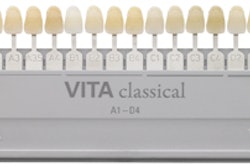Using a bone-creating protein to augment the maxillary sinus could improve the success rate of dental implants, according to Georgia Health Sciences University (GHSU) researchers in a presentation Friday at the Academy of Osseointegration annual meeting in Washington, DC.
Dental implants won't work if the bone in which they are anchored is too thin, and bone-thinning is a common cause and consequence following tooth loss, according to Ulf M.E. Wikesjö at the GHSU College of Dental Medicine.
The current favored solution is to supplement the area with bone grafts to stabilize the implant base, he noted. But that technique is problematic "primarily because it involves additional surgeries to harvest the bone," he said.
In animal studies, he and his team at the GHSU Laboratory for Applied Periodontal & Craniofacial Regeneration found that by implanting bone morphogenetic protein (BMP) in the sinus, more new bone will form within four weeks than using conventional bone grafting at the same site.
"We found that BMP induced superior bone quality over that following bone grafts, which improves the chances for successful implants," Wikesjö said. "BMP is phenomenal, because it's a true, off-the-shelf product with ease of use that can produce real results, and it could be the new gold standard for this procedure."



















